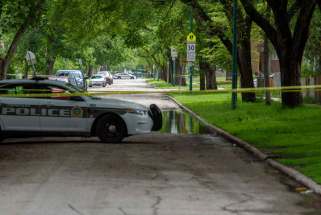Sexual violence reporting project to link campus resources U of M lone holdout as 11 post-secondary schools sign on
Read this article for free:
or
Already have an account? Log in here »
To continue reading, please subscribe:
Monthly Digital Subscription
$0 for the first 4 weeks*
- Enjoy unlimited reading on winnipegfreepress.com
- Read the E-Edition, our digital replica newspaper
- Access News Break, our award-winning app
- Play interactive puzzles
*No charge for 4 weeks then price increases to the regular rate of $19.00 plus GST every four weeks. Offer available to new and qualified returning subscribers only. Cancel any time.
Monthly Digital Subscription
$4.75/week*
- Enjoy unlimited reading on winnipegfreepress.com
- Read the E-Edition, our digital replica newspaper
- Access News Break, our award-winning app
- Play interactive puzzles
*Billed as $19 plus GST every four weeks. Cancel any time.
To continue reading, please subscribe:
Add Free Press access to your Brandon Sun subscription for only an additional
$1 for the first 4 weeks*
*Your next subscription payment will increase by $1.00 and you will be charged $16.99 plus GST for four weeks. After four weeks, your payment will increase to $23.99 plus GST every four weeks.
Read unlimited articles for free today:
or
Already have an account? Log in here »
Hey there, time traveller!
This article was published 09/07/2020 (1982 days ago), so information in it may no longer be current.
Students, staff and instructors at 11 post-secondary institutes in the province will soon be able to anonymously report incidents of sexual violence on campus and access related resources all in one online place.
This fall, Ending Violence Across Manitoba Inc. is launching a groundbreaking pilot in sexual violence reporting called REES (Respect, Educate, Empower Survivors), in partnership with local colleges and universities.
Each institution has customized a campus-specific offshoot of the trauma-informed platform (reescommunity.com), which aims to link online incident reporting and access to critical information about reporting options, campus sexual violence policies, and campus and community support services.
Here’s how it works: victims of sexual violence will be able to enter their accounts on the platform specific to the school community they are a part of, with the ability to share as much or as little information as they feel comfortable. Users can then choose to file an anonymous report, connect to their campus or file a police report.
“The purpose of REES really is twofold: one is to create a safe, secure space for survivors to report and to provide them with information that can inform the choices they make for themselves, and then also to gather pertinent data that can be utilized by post-secondary institutions to create safer campuses.”
– REES project manager Mary Lobson
“The purpose of REES really is twofold: one is to create a safe, secure space for survivors to report and to provide them with information that can inform the choices they make for themselves, and then also to gather pertinent data that can be utilized by post-secondary institutions to create safer campuses,” said project manager Mary Lobson.
Lobson said the hope is reporting will increase, owing to the anonymous, encrypted setup.
At the end of each semester, REES will provide each institution with all information submitted in anonymous reports on its campus website.
Assiniboine Community College, Brandon University, Booth University College, Canadian Mennonite University, Manitoba Institute of Trades and Technology, Providence University College and Theological Seminary, Red River College, University College of the North, and University of Winnipeg will launch campus-tailored versions in September.
Steinbach Bible College and the University of Saint-Boniface are expected to launch theirs in 2021; the latter’s will be active following the French-language launch of REES in January.

The federal department of women and gender equality is funding the $1-million pilot, which will run until late 2024.
EVA Manitoba was awarded the funding over five years to undertake REES — a project it proposed when Ottawa put out a call for concepts to address gender-based violence in 2018.
If Manitoba’s pilot is successful, REES could become a model for schools across the country, said Allison Kilgour, a Winnipeg advocacy co-ordinator with Students for Consent Culture.
“It’s really difficult to find a way to give survivors autonomy in their decision-making when it comes to reporting, because they’re often at the mercy of the system and processes in place,” Kilgour said. “(REES) puts control back into their hands.”
The second-year law student at the University of Manitoba said the centralized setup minimizes the amount of times community members have to relive traumatic experiences, and allows them to control when and where they share their stories.
“It’s really difficult to find a way to give survivors autonomy in their decision-making when it comes to reporting, because they’re often at the mercy of the system and processes in place, (REES) puts control back into their hands.”
– Allison Kilgour, Winnipeg advocacy co-ordinator with Students for Consent Culture
The U of M is the only post-secondary school in the province yet to join REES.
A university spokesman said experts in sexual violence are reviewing the system within the U of M context, and will follow-up after that process is complete.
Lobson first contacted U of M about the idea in 2017, around the same time provincial legislation was enacted to require schools to implement sexual violence policies and start publicly reporting incident data.
At Brandon University, students can contact any staffer to disclose an incident and, as per the policy, are directed to the school’s sexual violence education and prevention co-ordinator.
In 2018-19, 13 individuals accessed in-person support from co-ordinator Carla Navid. Of that count, four individuals reported having personally experienced an incident of sexualized violence, ranging from cyber stalking to sexual assault.
Navid said Thursday REES will allow schools to pinpoint trends about the type of violence happening on campus, where it’s happening and who the alleged perpetrators are, adding: “If we don’t know who’s doing it, we’re never going to end sexual violence.”
An estimated 15 to 25 per cent of post-secondary-aged women in North America experience sexual assault throughout their academic career.
maggie.macintosh@freepress.mb.ca
Twitter: @macintoshmaggie

Maggie Macintosh reports on education for the Winnipeg Free Press. Funding for the Free Press education reporter comes from the Government of Canada through the Local Journalism Initiative.
Our newsroom depends on a growing audience of readers to power our journalism. If you are not a paid reader, please consider becoming a subscriber.
Our newsroom depends on its audience of readers to power our journalism. Thank you for your support.







